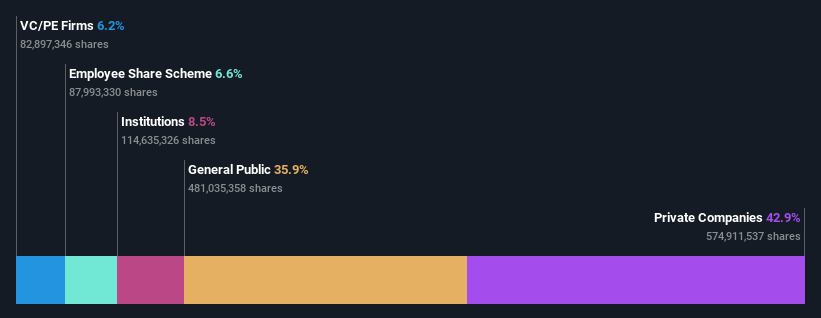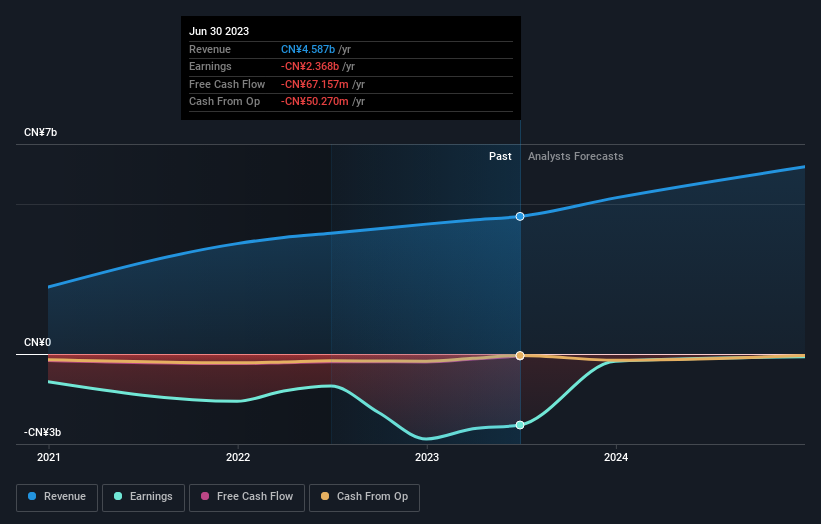Stock Analysis
- Hong Kong
- /
- Food and Staples Retail
- /
- SEHK:9886
Dingdang Health Technology Group Ltd.'s (HKG:9886) market cap dropped HK$376m last week; Private companies bore the brunt

Key Insights
- Dingdang Health Technology Group's significant private companies ownership suggests that the key decisions are influenced by shareholders from the larger public
- The top 4 shareholders own 56% of the company
- Using data from company's past performance alongside ownership research, one can better assess the future performance of a company
Every investor in Dingdang Health Technology Group Ltd. (HKG:9886) should be aware of the most powerful shareholder groups. And the group that holds the biggest piece of the pie are private companies with 43% ownership. In other words, the group stands to gain the most (or lose the most) from their investment into the company.
And last week, private companies endured the biggest losses as the stock fell by 16%.
Let's take a closer look to see what the different types of shareholders can tell us about Dingdang Health Technology Group.
Check out our latest analysis for Dingdang Health Technology Group

What Does The Institutional Ownership Tell Us About Dingdang Health Technology Group?
Many institutions measure their performance against an index that approximates the local market. So they usually pay more attention to companies that are included in major indices.
We can see that Dingdang Health Technology Group does have institutional investors; and they hold a good portion of the company's stock. This implies the analysts working for those institutions have looked at the stock and they like it. But just like anyone else, they could be wrong. If multiple institutions change their view on a stock at the same time, you could see the share price drop fast. It's therefore worth looking at Dingdang Health Technology Group's earnings history below. Of course, the future is what really matters.

Dingdang Health Technology Group is not owned by hedge funds. Our data shows that Go Far Limited is the largest shareholder with 22% of shares outstanding. Delight Faith Limited is the second largest shareholder owning 21% of common stock, and China Merchants Fund Management Company Ltd. holds about 6.9% of the company stock.
On looking further, we found that 56% of the shares are owned by the top 4 shareholders. In other words, these shareholders have a meaningful say in the decisions of the company.
While it makes sense to study institutional ownership data for a company, it also makes sense to study analyst sentiments to know which way the wind is blowing. There is a little analyst coverage of the stock, but not much. So there is room for it to gain more coverage.
Insider Ownership Of Dingdang Health Technology Group
The definition of an insider can differ slightly between different countries, but members of the board of directors always count. The company management answer to the board and the latter should represent the interests of shareholders. Notably, sometimes top-level managers are on the board themselves.
Insider ownership is positive when it signals leadership are thinking like the true owners of the company. However, high insider ownership can also give immense power to a small group within the company. This can be negative in some circumstances.
Our data cannot confirm that board members are holding shares personally. It is rare to see such a low level of personal ownership, amongst the board (and it is possible that our data might be incomplete). Concerned investors should check here to see if insiders have been selling or buying.
General Public Ownership
The general public-- including retail investors -- own 36% stake in the company, and hence can't easily be ignored. While this group can't necessarily call the shots, it can certainly have a real influence on how the company is run.
Private Equity Ownership
With an ownership of 6.2%, private equity firms are in a position to play a role in shaping corporate strategy with a focus on value creation. Sometimes we see private equity stick around for the long term, but generally speaking they have a shorter investment horizon and -- as the name suggests -- don't invest in public companies much. After some time they may look to sell and redeploy capital elsewhere.
Private Company Ownership
Our data indicates that Private Companies hold 43%, of the company's shares. It's hard to draw any conclusions from this fact alone, so its worth looking into who owns those private companies. Sometimes insiders or other related parties have an interest in shares in a public company through a separate private company.
Next Steps:
While it is well worth considering the different groups that own a company, there are other factors that are even more important. Case in point: We've spotted 1 warning sign for Dingdang Health Technology Group you should be aware of.
But ultimately it is the future, not the past, that will determine how well the owners of this business will do. Therefore we think it advisable to take a look at this free report showing whether analysts are predicting a brighter future.
NB: Figures in this article are calculated using data from the last twelve months, which refer to the 12-month period ending on the last date of the month the financial statement is dated. This may not be consistent with full year annual report figures.
Valuation is complex, but we're helping make it simple.
Find out whether Dingdang Health Technology Group is potentially over or undervalued by checking out our comprehensive analysis, which includes fair value estimates, risks and warnings, dividends, insider transactions and financial health.
View the Free AnalysisHave feedback on this article? Concerned about the content? Get in touch with us directly. Alternatively, email editorial-team (at) simplywallst.com.
This article by Simply Wall St is general in nature. We provide commentary based on historical data and analyst forecasts only using an unbiased methodology and our articles are not intended to be financial advice. It does not constitute a recommendation to buy or sell any stock, and does not take account of your objectives, or your financial situation. We aim to bring you long-term focused analysis driven by fundamental data. Note that our analysis may not factor in the latest price-sensitive company announcements or qualitative material. Simply Wall St has no position in any stocks mentioned.
About SEHK:9886
Dingdang Health Technology Group
Dingdang Health Technology Group Ltd. operates as a service provider in the digital health on-demand business in the People’s Republic of China.
Flawless balance sheet and fair value.

